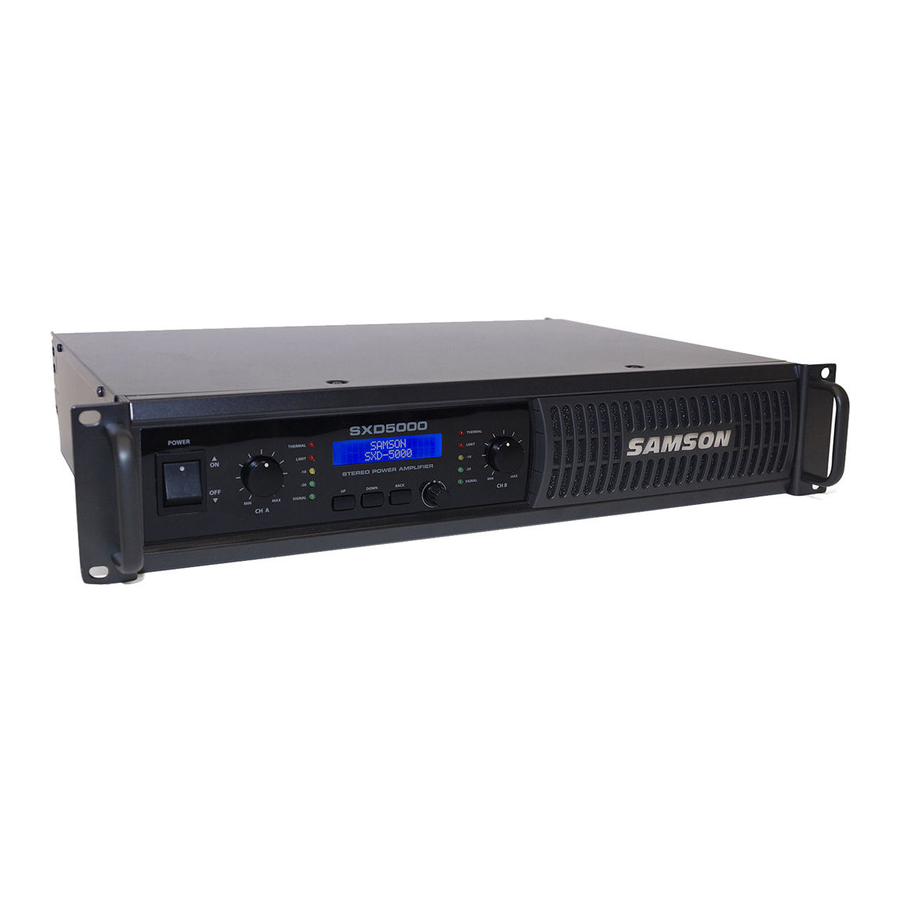Subscribe to Our Youtube Channel
Summary of Contents for Samson SXD3000
- Page 1 SXD3000 - 900 Watt Stereo Power Amplifier SXD5000 - 1,500 Watt Stereo Power Amplifier SXD7000 - 2,000 Watt Stereo Power Amplifier Owner's Manual...
-
Page 2: Important Safety Information
Important Safety Information CAUTION: TO REDUCE THE RISK OF ELECTRIC SHOCK, DO NOT REMOVE COVER (OR BACK). NO USER-SERVICEABLE PARTS INSIDE. REFER SERVICING TO QUALIFIED SERVICE PERSONNEL. This lightning flash with arrowhead symbol within an equilateral triangle is intended to alert the user to the presence of non-insulated “dangerous voltage”... -
Page 3: Table Of Contents
Specifications ....... . 15 Copyright 2014 Samson Technologies Corp. 45 Gilpin Avenue... -
Page 4: Introduction
The convenient two rack-space design is compact, and yet there’s plenty of power available, with 2 x 450 Watts at 4Ω for the SXD3000, 2 x 750 Watts at 4Ω for the SXD5000, and 2 x 1000 Watts at 4Ω for the SXD7000 over the full frequency spectrum, from 20 Hz to 20 kHz. - Page 5 • High power for performance and installation speaker configurations: SXD3000 2 x 300 Watts at 8Ω and 2 x 450 Watts at 4Ω SXD5000 2 x 400 Watts at 8Ω and 2 x 750 Watts at 4Ω SXD7000 2 x 550 Watts at 8Ω and 2 x 1000 Watts at 4Ω...
-
Page 6: Getting Started With The Sxd Power Amplifier
Getting Started with the SXD Power Amplifier Setting up your SXD Series is a simple procedure which takes only a few minutes: Remove all packing materials (save them in case your units needs future service) and decide where the amplifier is to be physically placed—it can be used free-standing or mounted in a standard 19”... -
Page 7: Front Panel Callouts
Front Panel Callouts LED Indicators The front panel LED indicators continuously monitor the power output level for the corresponding channel. LCD Display THERMAL: Lights red whenever the thermal protection is Backlit display shows current activated setup information and navigation LIMITER: Lights red whenever the output limiter is activated through the DSP settings -20/-10: Lights whenever the output level reaches -20dB or -10dB, respectively, below the distortion or clipping... -
Page 8: Rear Callouts
Rear Callouts Circuit Breaker Exhaust Fan This circuit breaker will trip if there is a This variable-speed fan provides cool- fault with the mains voltage or if maximum ing to amplifier. Make sure that both output is overloaded for an period. Push it the front and rear panels are kept in to restart the amplifier after a short rest free of all obstructions and that cool,... -
Page 9: Getting Started - Dsp
The SXD power amplifier features sophisticated high-performance DSP with control for the input and output routing, filter network, EQ, limiter, and time alignment delay. Follow these steps to navigate through the SXD internal DSP settings: Samson 1. Turn the SXD power ON. The startup screen will be displayed (figure 1). - Page 10 Getting Started - DSP EQ - In Manual mode there are three EQ filters per channel. The Low frequency adjustment can be set to a Low Frequency Shelf or to a parametric equalizer (PEQ) with Frequency, Q, and Gain adjustments. The mid band is a parametric equal- izer (PEQ) with Frequency, Q, and Gain adjustments.
-
Page 11: Presets
Presets The SXD DSP features four speaker presets that will allow you to quickly have your amplifier up and running with your speaker configuration. The presets only display the parameters that are essential to the speaker arrangement. If you require additional adjustments, all parameter adjustments are available in Manual mode. -
Page 12: System Setup Examples
System Setup Examples Typical SXD amplifier and speaker configurations for each Input and Output (I/O) setting in the DSP Stereo Input: Stereo Full Range Speakers Ch A level control adjusts Ch 1 Output Ch B level control adjusts Ch 2 Output Mono A+B Dual: Subwoofer and Satellite Ch A level control adjusts Ch 1 Output Ch B level control adjusts Ch 2 Output... - Page 13 System Setup Examples Parallel A Link: Mono 2-Way Cabinet Ch A level control adjusts Ch 1 and Ch 2 Output Parallel A Dual: Subwoofer and Satellite Ch A level control adjusts Ch 1 Output Ch B level control adjusts Ch 2 Output SXD Series Power Amplifiers with DSP...
-
Page 14: Wiring Guide
Wiring Guide Unbalanced ¼” Connector Signal Signal Tip (signal) Ground Ground Sleeve (ground) Balanced TRS ¼” Connector -Signal (tip) Tip (-signal) +Signal (tip) Ring (+signal) +Signal (tip) Ground -Signal (ring) Ground Sleeve (ground) XLR Balanced Connector Common (1) +Hot (2) +Hot (ground) Common (ground) -
Page 15: Specifications
Specifications Model SXD3000 SXD5000 SXD7000 Rated Output Power 8 ohms 300W 500W 700W Stereo both channel driven 4 ohms 450W 750W 1000W Signal to Noise Ratio (20Hz-20k) 100dB Distortion (SMPTE-IM) 0.02% Input sensitivity @8ohms Voltage Gain 5dBu Voltage Gain 30dB... - Page 16 Samson Technologies Corp. 45 Gilpin Avenue Hauppauge, New York 11788-8816 Phone: 1-800-3-SAMSON (1-800-372-6766) Fax: 631-784-2201 www.samsontech.com...


















Need help?
Do you have a question about the SXD3000 and is the answer not in the manual?
Questions and answers